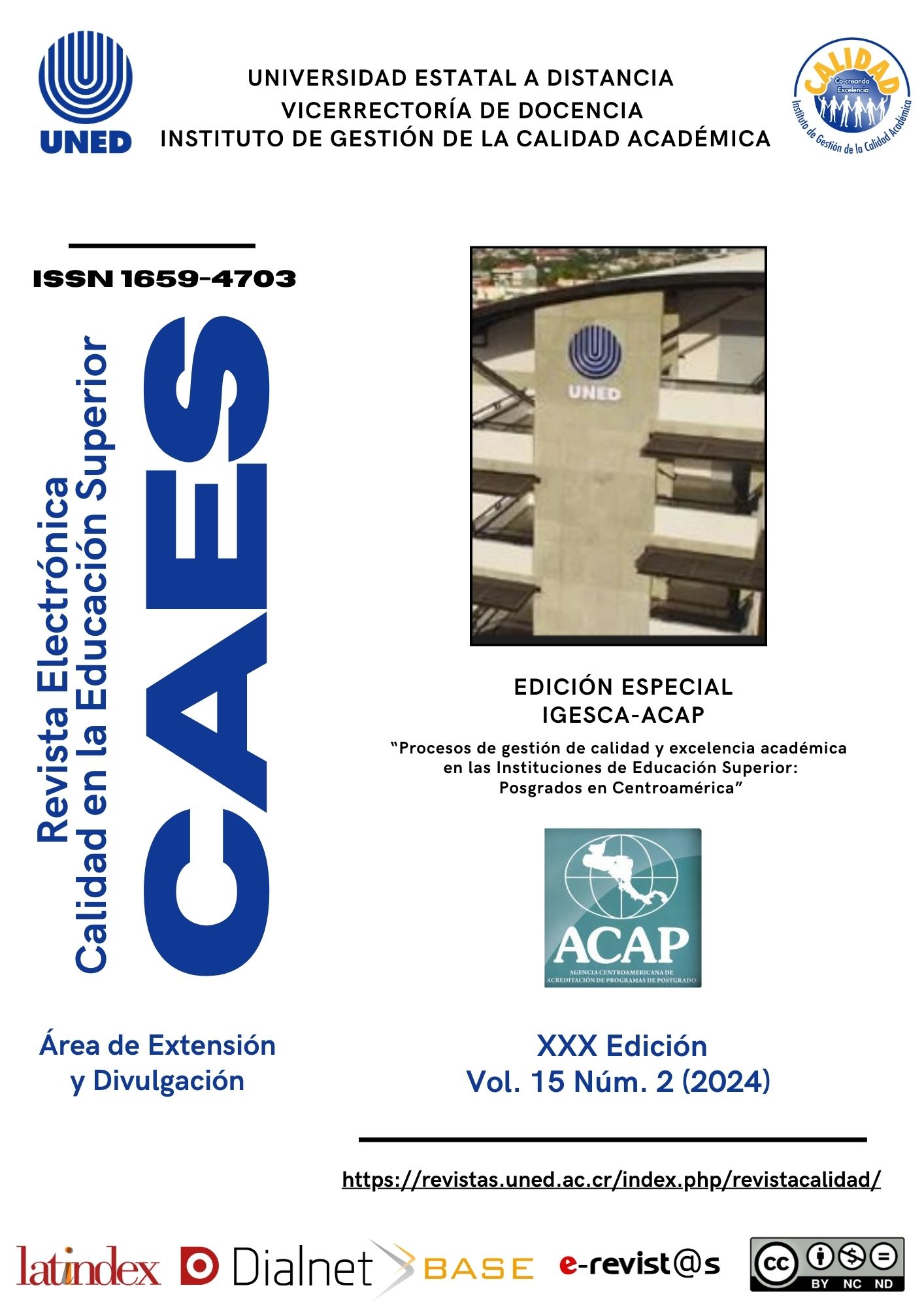Curricular Territory: Building Academic Freedom through Teaching Practice in the Implementation of the University Geography Curriculum
DOI:
https://doi.org/10.22458/caes.v15i2.5401Keywords:
academic freedom, curriculum, professional education, higher education, university teachingAbstract
Academic freedom is a term whose practical implementation represents a challenge and, therefore, its reflection must be critical and iterative. Under this premise, this document aims to build a discussion around the conceptualization and meanings of academic freedom through a documentary review of the concept and the collection of both institutional and faculty discourses. In this study, a short interview is conducted with faculty members of the Escuela de Geografía and the legal advisor to the Vicerrectoría de Docencia at the University of Costa Rica, understanding that this institution is the framework in which academic freedom is exercised as a fundamental principle. The analysis of the findings allows us to present a self-assessment tool aimed at practicing professors who wish to evaluate their degree of awareness of academic freedom through their knowledge and pedagogical decisions. With this tool, they will be able to identify those notions that allow them to develop a critical, reflective, and conscious stance on the relationship between teaching practice, academic freedom, and its limits.
References
Arce, C. (2004). La Libertad de Cátedra. Revista Ciencias Jurídicas, (104), 71-90. https://revistas.ucr.ac.cr/index.php/juridicas/article/view/13355/14346
Beiter, K., Karran, T. y Appiagyei-Atua, K. (2016). Academic freedom and its protection in the law of European states: Measuring an international human right. European Journal of Comparative Law and Governance, 3(3), 254-345. https://doi.org/10.1163/22134514-00303001
Calderón, M. (2013). La Libertad de Cátedra y sus Implicaciones. Análisis a partir de la conceptualización de los Académicos del ITCR [Informe Final de Proyecto de Investigación]. Instituto Tecnológico de Costa Rica. Repositorio TEC. https://www.tec.ac.cr/proyectos/libertad-catedra-sus-implicaciones-analisis-partir-conceptualizacion-academicos-itcr
Campos, R. (2020). La libertad de cátedra y la universidad que innova. Actualidades Investigativas en Educación, 20(1), 1-21. http://dx.doi.org/10.15517/aie.v20i1.39935
Consejo Universitario. (1974). Estatuto Orgánico de la Universidad de Costa Rica. https://www.cu.ucr.ac.cr/normativ/estatuto_organico.pdf
Consejo Universitario. (2009). Reglamento de Régimen Disciplinario Docente. https://www.cu.ucr.ac.cr/normativ/regimen_disciplinario_docente.pdf
Consejo Universitario. (2017). Pronunciamiento sobre la libertad de cátedra en la Universidad de Costa Rica. https://www.cu.ucr.ac.cr/pronunciamientos/2017/pronun79.pdf
Constitución Política de Costa Rica [Const]. 07 de noviembre de 1949 (Costa Rica).
Expósito, E. (2013). Libertad de cátedra del profesor universitario. Contenido y amenazas en el contexto actual de reforma del modelo de universidad pública. Revista de Educación y Derecho, (07). https://doi.org/10.1344/re&d.v0i07.5866
Karran, T. y Mallinson, L. (2017). Academic freedom in the UK: Legal and normative protection in a comparative context. Policy Reviews in Higher Education, 1(2), 209-241. https://doi.org/10.1080/23322969.2017.1307097
Madrid, R. (2013). El derecho a la libertad de cátedra y el concepto de universidad. Revista Chilena de Derecho, 40 (1), 355-371. http://dx.doi.org/10.4067/S0718-34372013000100016
Molina, E., Aguado, G. y Nettel, A. (2017). La libertad de cátedra y el modelo de universidad. Digital ciencia@UAQro. https://www.uaq.mx/investigacion/revista_ciencia@uaq/ArchivosPDF/v10-n1/Arti.7.pdf
Oficina Jurídica -UCR. (2003). Dictamen OJ-1906-2003
Oficina Jurídica -UCR. (2012). Dictamen OJ-827-2012
Oficina Jurídica -UCR. (2013). Dictamen OJ-1122-2013.
Oficina Jurídica -UCR. (2017). Dictamen OJ-971-2017.
Oficina Jurídica -UCR. (2021). Dictamen OJ-382-2021
Oficina Jurídica -UCR. (2022). Dictamen OJ-834-2022.
Retana-Quirós, D. y González-García, V. (2023). Territorio curricular: definiendo la flexibilidad como principio transversal del currículo en Geografía-UCR. Revista Electrónica Calidad En La Educación Superior, 14(2), 320–363. https://doi.org/10.22458/caes.v14i2.4865
Solano, J., Madrid, B. I., Galeano, D. y Batres, A. (2022). Libertad de cátedra: una solución o parte del problema. Innovare: Revista De Ciencia Y tecnología, 11(3), 172–181. https://doi.org/10.5377/innovare.v11i3.15357
Suárez, R. (2011). Contenido y límites de la libertad de cátedra en la enseñanza pública no universitaria. Revista de Derecho UNED, (9), 421-462. https://dialnet.unirioja.es/servlet/articulo?codigo=3961817
UNESCO. (1966). Recomendación de la OIT y la UNESCO relativa a la situación del personal docente. https://www.unesco.org/es/legal-affairs/recommendation-concerning-status-teachers
UNESCO. (1997). Recomendación de la UNESCO relativa a la condición del personal docente de la enseñanza superior. https://www.unesco.org/es/legal-affairs/recommendation-concerning-status-higher-education-teaching-personnel?hub=66535
Vidal, C. (2008). Libertad de cátedra y organización de la docencia en el ámbito universitario. Revista Española de Derecho Constitucional, (84), 61-103. https://dialnet.unirioja.es/servlet/articulo?codigo=2775812
Downloads
Published
How to Cite
Issue
Section
License
Copyright (c) 2024 Revista Electrónica Calidad en la Educación Superior

This work is licensed under a Creative Commons Attribution-NonCommercial 4.0 International License.
Esta revista provee acceso libre inmediato a su contenido bajo el principio de que hacer disponible gratuitamente la investigación al publico, lo cual fomenta un mayor intercambio de conocimiento global.
